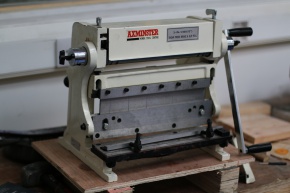Sheet Metal Tool: Difference between revisions
Jump to navigation
Jump to search
risk assessment added |
m Gloves |
||
| Line 9: | Line 9: | ||
This is a combination roller/shear/press brake for use on thin sheet metal up to 305mm wide and 1mm (rolling) or 0.5mm (shearing) thick. | This is a combination roller/shear/press brake for use on thin sheet metal up to 305mm wide and 1mm (rolling) or 0.5mm (shearing) thick. | ||
You should wear gloves and eye protection when using this tool. Sheet metal is sharp and presents a hazard to the user. | |||
| Line 41: | Line 43: | ||
* Users will be required to demonstrate competency or be given instruction in safe use. | * Users will be required to demonstrate competency or be given instruction in safe use. | ||
* Safety glasses will be worn. | * Safety glasses will be worn. | ||
* Protective gloves will be worn. | |||
Revision as of 08:40, 12 May 2017
 | |
| Equipment Information | |
|---|---|
| Status | Unknown |
| Manufacturer | Axminster |
| Model | 3-in-1 |
| Hackspace Information | |
| Induction Required | No |
| Card RFID Enabled | No |
| Owner | Ben Frederiks |
This is a combination roller/shear/press brake for use on thin sheet metal up to 305mm wide and 1mm (rolling) or 0.5mm (shearing) thick.
You should wear gloves and eye protection when using this tool. Sheet metal is sharp and presents a hazard to the user.
Hazards.
- 1) Chips in eyes.
- 2) Sharp objects and chips cutting fingers.
- 3) Crush/ severing of digits
Persons at risk.
- Operator.
- Persons nearby
Initial assessment of risk.
| Hazard identified | Severity | Probability | Risk Factor |
| Chips in eyes | 3 | 2 | 6 |
| Cuts from sharp objects | 1 | 3 | 3 |
| Crush/ severing of digits | 3 | 2 | 6 |
Control measures.
- Users will be required to demonstrate competency or be given instruction in safe use.
- Safety glasses will be worn.
- Protective gloves will be worn.
Final assessment of risk
| Hazard identified | Severity | Probability | Risk Factor |
| Chips in eyes | 2 | 1 | 2 |
| Cuts from sharp objects | 1 | 2 | 2 |
| Crush/ severing of digits | 3 | 1 | 3 |
Points system
| Hazard severity | Points Rating | Definition |
| Nil | 1 | Very minor injury, bruise, graze, no risk of disease. |
| Slight | 2 | Minor injury, which would allow the individual to continue work after first aid treatment on site or at a local surgery. The duration of the stoppage or treatment is such that the normal flow of work is not seriously interrupted. |
| Moderate | 3 | Temporary disability causing injury or disease capable of keeping an individual off work for three days or more and reportable under RIDDOR |
| High | 4 | Causing death, serious injury or permanent disability to an individual. |
| Very high | 5 | Causing multiple deaths and widespread destruction eg. fire, building collapse. |
| Hazard likelihood | Points Rating | Definition |
| Remote possibility | 1 | There is really no risk present. Only under freak conditions could there be any possibility of an accident or illness. All reasonable precautions have been taken - This should be the normal state of the workplace. |
| Unlikely | 2 | This incident or illness might occur but the probability is low and the risk minimal. |
| Possible | 3 | The accident may occur if additional factors precipitate it, but it is unlikely to happen without them. |
| Highly likely | 4 | Will happen more often than not. Additional factors could precipitate an incident but it is still likely to happen without this additional factor. |
| Inevitable | 5 | If the work continues as it is, there is almost 100% certainty that an accident will happen, for example:
A broken stair or broken rung on a ladder Bare, exposed electrical conductors Unstable stacks of heavy boxes |
| Risk Rating Score | Definition | Action |
| 1 to 4 | Low | No action required |
| 5 to 9 | Moderate | Reduce risks if reasonably practicable |
| 10 to 15 | High Risk | Priority action to be undertaken |
| 16 to 25 | Unacceptable | Action must be taken IMMEDIATELY |